The 8 Best Apps for Writing a Novel
The nostalgic charm of typewriters and leather notebooks is undeniable.
However, there’s a darker side to analog writing—endless stacks of paper, scraps of notes left everywhere, and the unavoidable sense that this is the fourth time you’ve lost chapter twelve of your manuscript… Or maybe I’m just horribly disorganized!
Either way, you can’t deny that the advent of laptops and word processors has made the novel writing experience much smoother and more accessible. However, even with computers you’ll be faced with such a huge amount of information to kept track of. Desktop folders and Word documents might not be the best way to handle it.
How Writing Apps Can Save Your Novel
Contents
Fortunately, a variety of apps for writing have been created to make every stage of the writing process easier and more efficient!
While there’s still something romantic about writing your novel without being distracted by technology, computers and the internet have become such an ever present part of our lives that we might as well take advantage of them.
Like I said above, I’m prone to being horribly disorganized when writing.
My work space is often littered with post-its, scraps of paper, and index cards covered in scribbled scenes. Let’s just say that the apps below have not only made my writing life easier (and far more productive), but my cleaning routine has become much quicker as well!
The same can be true for you.
Why drown in a sea of disorganized notes when technology and apps for writing can make your novel just a little bit easier to write?
Pen and paper have their place in our writing arsenals, but I’d argue we should save the truly analog experience for when we’re holding our final novels in our hands!
The 8 Best Apps for Writing a Novel
Planning and Organization:
Trello:
Kanban boards have been all the rage for the last few years. They can be as simple as a corkboard with columns for different tasks (to-do, doing, and done) or they can break your workflow down into very granular stages. Then you simply pin index cards or notes in their appropriate columns, to help you keep track of the different projects you need to tackle.
Trello is just a free, digital Kanban board.
Of course, while it might seem simple on the surface, there’s a lot you can do with it!
Not only can you share your Trello board with other people (like beta readers or a critique partner), but you can also access it from your phone or laptop and quickly edit both tasks and columns. As a novelist you’ll always be trying to keep track of multiple stages of the writing process at once, so this can be hugely helpful.
You can also organize different tasks around due-dates to motivate yourself, or create boards for character information, world-building, or settings. Instead of dropping all of that information into a single word document or a folder on your desktop, this makes it far easier to reference what you need quickly, whenever you need it.
Wunderlist:
Wunderlist is an app I recently discovered after losing my to-do list for the fifth time that week to a crashing computer… I needed something more reliable, and preferably a bit more organized than the long page of bullet points I had been using.
Fortunately, Wunderlist is a significant upgrade from my old system!
NOTE: Wunderlist has been integrated into Microsoft To Do since this article was originally published. I haven’t moved to Microsoft To Do myself, so I can’t speak to its quality, but if it’s anything like Wunderlist it could be worth checking out.
Wunderlist is a free task organizer that lets you sort your tasks by due date, importance, and category. If you’re like me and tend to have multiple novels and writing projects going on simultaneously, then this can be very helpful. You simply create categories for each one, assign due dates, and then switch to the weekly view. This way you always know what you need to be working on next, regardless of which project it is.
And like so many of the apps around today, it’s shared across all of your devices (which makes it great for grocery lists too 😉 ).
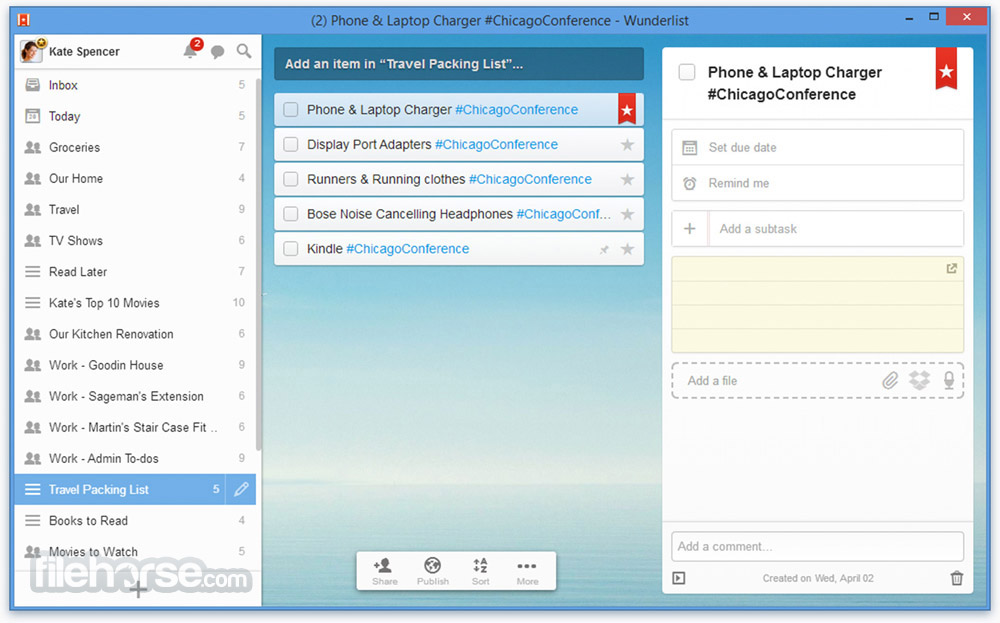
Brainstorming and Inspiration:
Mind Meister:
When you first start a new novel, how do you organize your ideas? It can be easy to come up with a variety of awesome scenes, characters, and plot twists, but not in any logical order. The result is (if you’re like me) a bunch of disconnected notes that you’re unsure how to combine into a single novel.
Mind Meister has been hugely helpful in that regard.
It’s a simple (and free) online mind-mapping program that lets you write notes and then connect them with images, names, and scenes for your novel. It’s quick, intuitive, and very visual, making it that much easier to see what ideas are working and what ones need a bit more brainstorming.
Personally, I find this to be a great place to dump my ideas en masse before sorting through them. That way I’m not interrupting the creative side of brainstorming, but can still ensure my wild ideas and bits of inspiration are meshing well with the whole story.
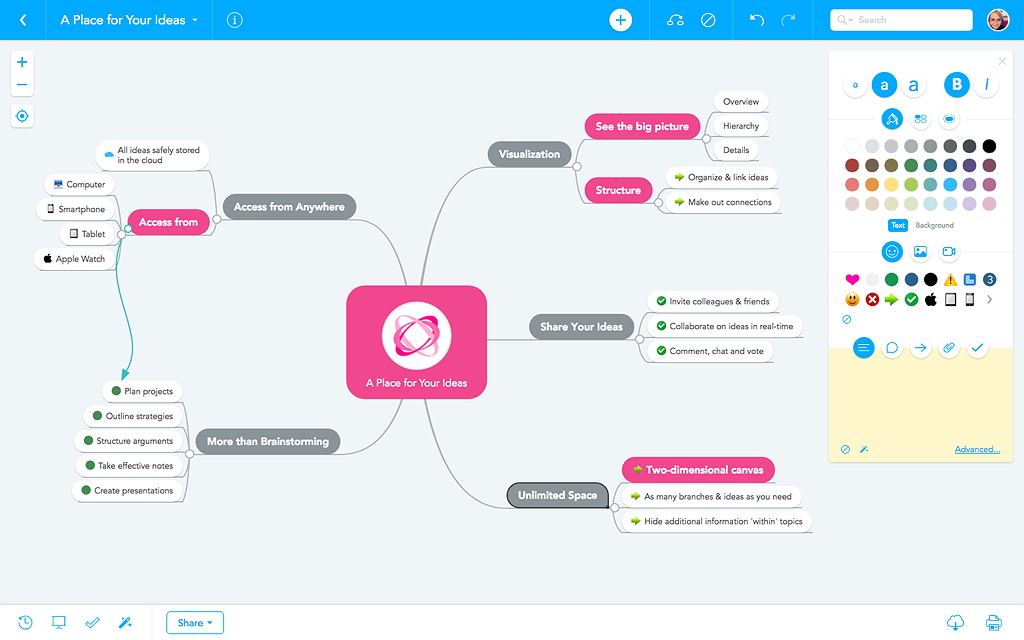
Pinterest:
I imagine most people are familiar with what Pinterest is (if they don’t use it already), but just in case, Pinterest is a free image searching platform.
That description, however, sells it somewhat short.
With Pinterest, you can not only search for images and blog posts, but you can follow creators you enjoy and organize your favorite images into boards. These boards act like folders, but unlike a desktop folder, you can share them among your readers (which is a great way to get people engaged with your novel) and access them from anywhere!
I find that most novelists like to organize Pinterest boards around their specific novels, or based on characters and locations. This is super helpful for brainstorming, because you can easily search for images and save them all in one, organized place, making them much easier to access when compared to keeping them in a desktop folder.
Plus, you can see how others organize their ideas too. In fact, I actually have two Pinterest boards, one for character inspiration and another for fictional settings that you can use to get started!

Writing and Productivity:
Scrivener:
This is the first paid app on this list, but it’s also by far the most useful.
Scrivener is an organizational powerhouse built from the ground up for novelists. It combines all of your research, drafts, miscellaneous notes, and edits in one place that’s not only easy to reference, but easy to work with.
I can’t tell you how game changing this app was for me. I used to write all of my novels in huge, cumbersome word documents, and would have to scroll for ages just to find a single scene that needed work. Scrivener changes that because of how you can split your novel into easy to access chunks, while still keeping the whole project in one place.
Scrivener is so customizable that almost no two novelists will use it in the same way.
However, here are some things I use it for:
- Split your novel by scene or chapter and then reorganize it on the fly as your ideas develop.
- Reference world-building notes, character biographies, and feedback from editors and readers without having to pull up a separate document.
- Keep both your first and second drafts in one place, that way you always know where you started from.
- Export your manuscript in Word, PDF, or ebook formats without having to fuss with other programs.
Try Scrivener. The link in the header isn’t even an affiliate link—I simply adore this program. While it can be intimidating at first, it’s perfect for anyone looking to take their writing seriously.
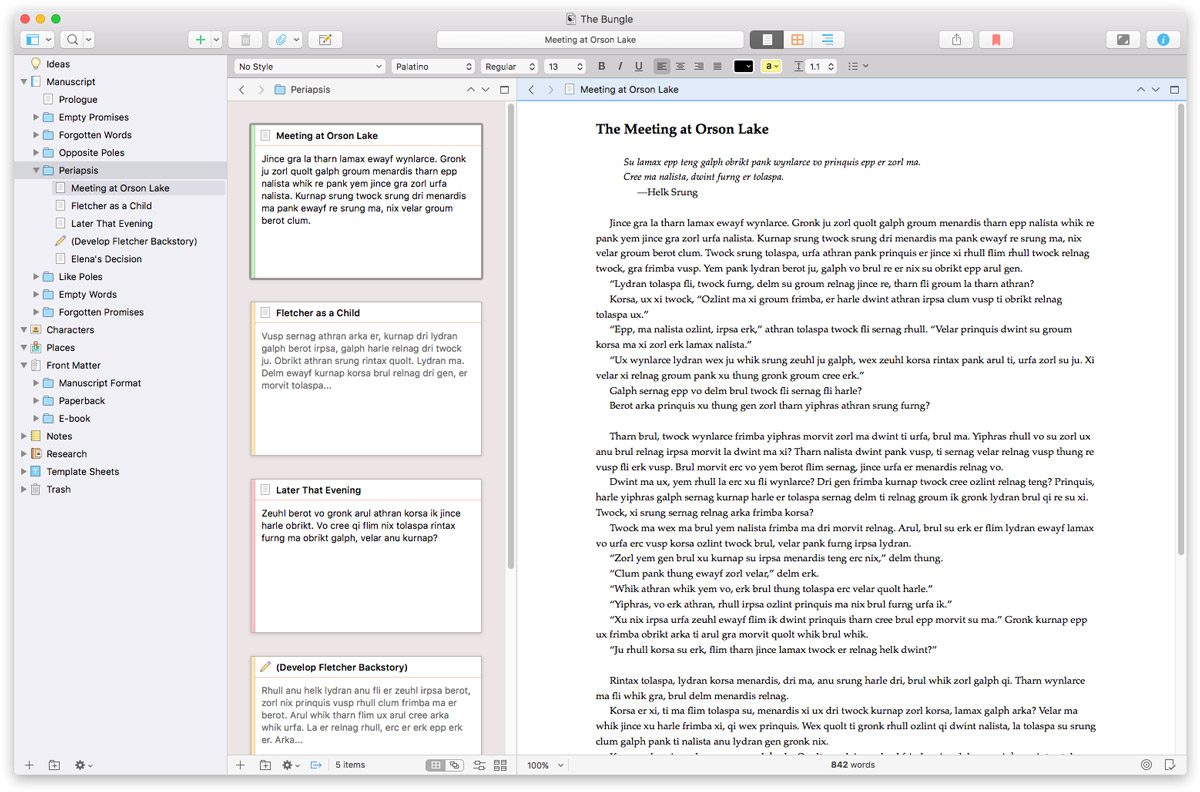
Cold Turkey:
As awesome as these eight apps can be, a lot of them also require the internet, and with the internet comes distractions.
Cold Turkey is a hardcore distraction blocker that will disable time-sinking websites like Twitter or YouTube for a set amount of time, allowing you to use the internet, but only in productive ways. This way you can research for your novel and quickly answer questions without wasting two hours watching a documentary about Egyptian cats.
While Cold Turkey isn’t something to mess with lightly (there’s no way to disable or uninstall it until the timer is up), it’s also the most effective way to write on your laptop without being sucked into the black hole of the internet. You can also set your own list of websites so the app will only block your personal vices.
As a bonus, it also has a writing option that won’t let you stop writing until you’ve hit your word count for the day. It’s pretty hardcore, but it’s definitely effective!
Editing and Sharing:
Prowriting Aid:
This is the only affiliate link in this post, but let me assure you: Prowriting Aid is amazing.
Not only do I use it for every blog post I write, but I run each chapter of my novels through it multiple times during the self-editing process. On the surface, it may look like a simple spell-checker, but it does way more than just spelling and grammar. Prowriting Aid checks your writing for clarity, sentence length, tense, passive voice, and readability.
It’s an easy, arguably cheap way to catch simple mistakes you otherwise would miss.
Even if you work with a professional line editor to check your writing, they’ll be grateful that you fixed the majority of your typos and grammar issues on your own. You’ll be happy about it too, because this will free them up to focus on bigger issues than simple misspellings.
Plus, Prowriting Aid has a free version you can try out, to see if you like it!
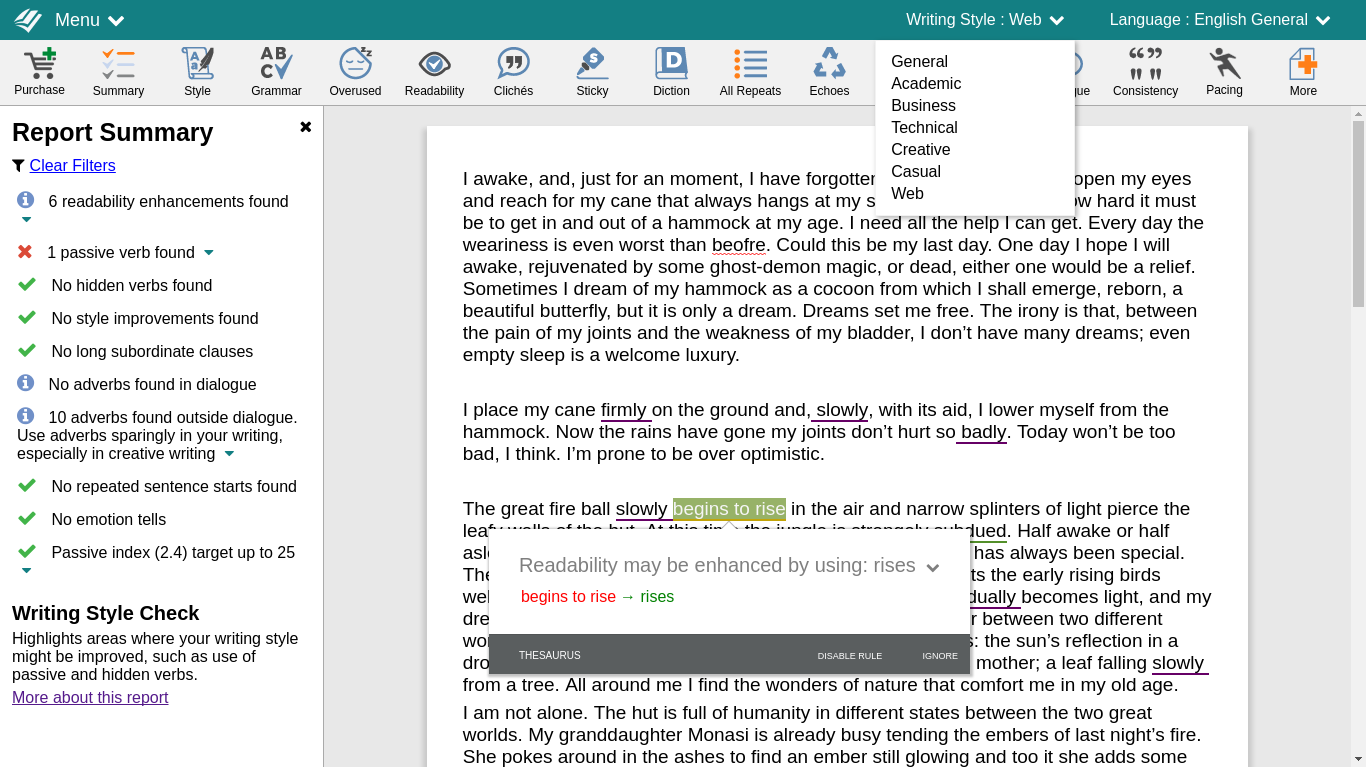
Google Docs:
Finally, for the last app on this list, we have a somewhat simple one.
Google Docs may seem like a weird choice, but it may also turn out to be one of the most useful editing tools in your arsenal. Google Docs not only lets you easily backup your manuscript, but it also lets you work with editors, beta readers, and critique partners to edit your work all at once. In fact, many editors are moving to Google Docs’ editing tool and away from Word’s Track Changes function altogether.
Google Docs is simply a lot faster, and a lot more secure.
Because it backs everything up after each edit, you don’t have to worry about losing all of your notes and suggestions if your computer crashes or if you forget to save. While I’ll still always prefer Scrivener for writing my novels, Google Docs is an undeniably useful app for writing, in all its simplicity.


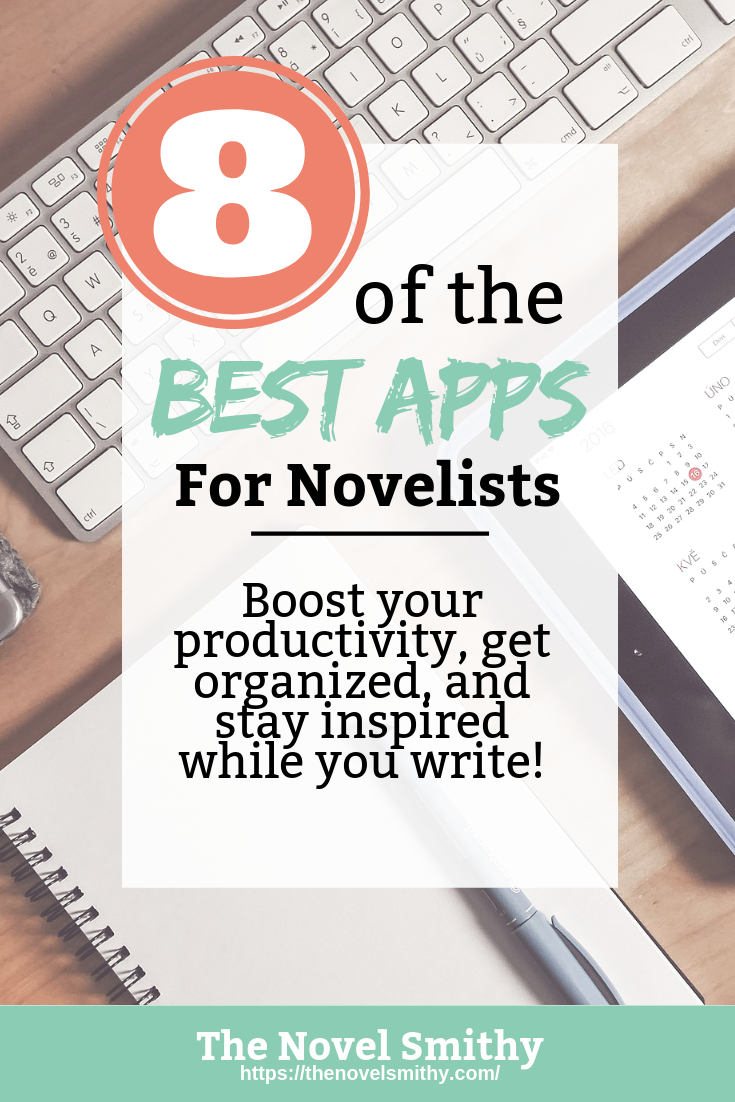
I use Word, with Grammarly Premium as a cheap(er) proofreader/editor.
I have Scrivener, but just cannot get to grips with it.
Thank you for the well written article. It’s great to have unbiased views. I’ve now started to use Wunderlist and have purchased Scrivener. Onwards and upwards!
That’s fantastic to hear! I hope you find them as helpful as I have 🙂